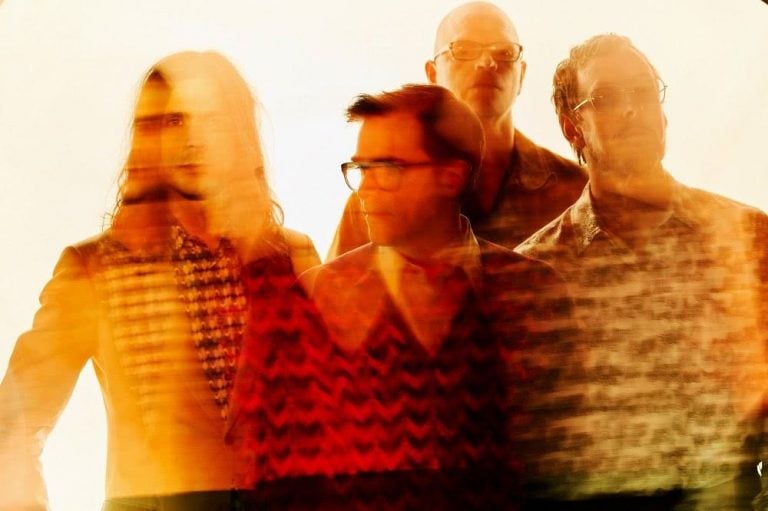You’ve got to hand it to Weezer: even after 25 years, the alt-rockers are continuing to subvert the general public’s perception of their music. While they have certainly been divisive throughout their career, at the heart of their songs lies an unashamedly pop sensibility, and it’s precisely this that has given the four-piece their stunning vitality.
Not that ‘vitality’ is the first word that comes to one’s mind when talking to the band’s bassist, Scott Shriner. With the band preparing to release Pacific Daydream, their eleventh album, and to tour Australia with the Foo Fighters, one would assume that Shriner would be bursting at the seams with excitement. But in actuality, when the call is finally connected after countless delays, Shriner sounds bored of the interview before it has even begun.
Talk turns first to the album’s worth of material that preceded Pacific Daydream; sonic drafts that never made the light of day. Shriner, for his part, is quick to interject with a snapped clarification. “Nothing in Weezer is ever scrapped,” he says tersely. “We decided to go in a different direction, and those songs will merely be set aside for now. After the song ‘Feels Like Summer’ did well in the States, we decided to record some more songs in that vein. We thought it sounded great, in that we didn’t think it really sounded like us. The material we’ve put aside will become The Black Album, and as the title suggests, it’s a little darker.”
As for the sonic inspirations behind Pacific Daydream, Shriner keeps his answer simple. “I’m going to say somewhere between The Beach Boys and The Clash. What’s really neat about this record is the middle eight sections, which I think are super interesting. They’re some of the coolest bridges we’ve ever had on any album. They’re usually the part of every song that I get really happy about.”
Nothing in Weezer is ever scrapped.
Perhaps some of Shriner’s frustration comes from feeling tired of being pigeonholed. As far as he is concerned, the band is far too often thought of in a particular way, with their back catalogue in general – and their celebrated album Pinkerton in particular – used as the yardstick by which their every creative whim is judged. For Shriner then, the change of pace in production styles between Pacific Daydream and their previous record The White Album was very much needed; not only on a creative level, but on a personal one too.
Love Music?
Get your daily dose of metal, rock, indie, pop, and everything else in between.
“There are a lot more effects on Rivers’ [Cuomo, lead singer] vocals on this album. Butch [Walker, producer] isn’t so attached to what he thinks Weezer should sound like, or how the first two albums sounded. He’s into taking Rivers’ songs and making new statements with them.
“On The White Album, our producer Jake Sinclair was such a hardcore Weezer fan from way back, so he was just like, ‘Oh no, no: you can’t do that. It doesn’t sound like you guys. You can’t put all that reverb and all those effects on Rivers’ voice. It’s not Weezer.’”
If Dave Grohl asks you to do something, who’s going to say no?
Walker’s method of recording the band also leaned heavily on modern technology, and he proved quickly to be a producer unafraid to dance along the very limits of the razor’s edge. “Butch works really fast. I think I probably spent a total of 12 hours recording my parts, including all the background vocals. We never played the songs together when we recorded the album either; it was all a very new way of working for us.”
When asked specifically about the themes on the album, particularly the exploration of reality and dreams, Shriner is cagey and condescending. “Who says that? Are you guessing? I don’t mean to give you a hard time,” he laughs, sourly. “I think a lot of the stories on this album come from Rivers’ personal experiences that he’s been collecting and documenting for some time. I don’t really get that reference.”
Thankfully, Shriner perks up a little when discussing the band’s upcoming tour, a trip around the country that is, as far as longterm Weezer fans are concerned, long-overdue. After all, the band didn’t play in Australia for 16 years between their first visit and 2013’s Blue Album and Pinkerton retrospective tour.
But now they’re heading back with none other than the Foo Fighters in tow, which Shriner describes as an opportunity that proved impossible to pass up. “If Dave Grohl asks you to do something, who’s going to say no? He’s such a fun guy, and I love how genuine and heartfelt he is.”
As for what the band will get up to in their spare time to remain levelheaded during their busy touring schedule, Shriner reveals the secret to Weezer’s sanity is golf. “Rivers and Pat [Wilson, drummer] have been golfing every day, and that seems to be helping the entire band out. If those two guys are getting along, then we’re doing great.”
There are a lot of people out there who haven’t been exactly convinced by Weezer’s new music; who feel that they have morphed, slowly but distinctly over the years, into something a little too flabby, and creatively dry. But while one might not be necessarily convinced by their newer material, it is certainly clear that they are only ever going to play by their own rules. And sure, that’s set to piss some people off – but in music, as in life, it’s better to be true to yourself than live in the shadow of the past.


































